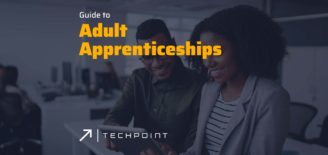OneAmerica® develops talent playbook other tech and tech-enabled companies can use
While the skilled trades like carpentry and masonry have had a clear pathway to employment since the 16th century through apprenticeships, and plumbing and electrical have had them for nearly 100 years, apprenticeships and other clearly defined paths into the professional services and industries—like technology—have lagged behind at best or never really taken hold.
Of course, the college degree has supplanted a clearly defined path in most professional services and industry channels. If someone wants to work in tech, for example, she or he can go get a college degree and then apply for jobs in tech. It’s not a complex formula and it’s been the primary path for decades. However, offering no entrance into your company’s ranks other than spending four years and $140,000 (on average) does close the door to many, many people who have great things to offer. And many of those shut out are likely to be minorities who are already underrepresented in too many professions.
OneAmerica®, whose companies boast a 140-year history legacy and today serve as a tech-enabled financial services firm, took up the cause of a clearly defined pathway two years ago when reports from the Brookings Metropolitan Policy Program and United Way highlighted that Central Indiana doesn’t have enough good and promising job opportunities for the working poor.
Two of the three tiers have already launched. Tier 1: Pathways to Sustainable Income launched in 2018 and ensured that all OneAmerica associates are either already at or on a performance-reviewed track to make $18 per hour plus health benefits. Tier 2: Pathways Junior Fellows Program is a full-time, paid summer employment opportunity for high school students who may or may not be college bound due to socioeconomic or other circumstances. Junior Fellows do extensive job shadowing, meet with multiple mentors and work on projects as a cohort team.
The third tier is the Pathways Career Track Program, which includes a part-time apprenticeship for students starting in their Junior year of High School. OneAmerica is developing the program with Ascend Indiana and EmployIndy, and it’s expected to launch in 2021. OneAmerica anticipates most, if not all, of its Pathways Career Track associates will be recruited from the Junior Fellows summer employees.
“What we’ve created is a way for underprivileged and underrepresented youth to get exposure to careers where they can make that $18 an hour livable wage and critical health insurance, too,” De’Niece said. “We want to hear from other companies, especially TechPoint member companies, software developers and other tech firms, that are interested in developing their own programs. We want to share our playbook—what we’ve learned over the past two years—and have an even greater impact as a community.”
The United Way of Central Indiana helped OneAmerica identify two zip codes with nearly 50% poverty rates from which the program recruited its first participants. Partnerships with Shepherd Community Center, Christel House South and Simon Youth Foundation provided excellent insights and connections to these communities.
One of the traditional roadblocks to programs like OneAmerica’s has been an aversion to bringing high school students into the professional work environment. The fear was that they might not be ready or would be too disruptive for the experience to deliver on its goals. OneAmerica, however, reports that its associates didn’t find the Junior Fellows disruptive in any way.
“I think fears that high school students bring chaos to the workplace is a myth,” De’Niece said. “We put a lot of structure into daily activities, getting exposure to different departments, meeting with mentors, making connections and building a network, working with the cohort and a capstone project. Quite frankly, our Junior Fellows are too busy to be disruptive.” De’Niece explained that the OneAmerica associates themselves got a lot out of working with and mentoring the fellows.
In addition to the cohort’s work outcomes, fellows rated the OneAmerica Pathways Program with a Net Promoter Score (NPS) of 100. Furthermore, 100% of the fellows reported being open to insurance-based careers and 100% plan to apply for full-time jobs at OneAmerica in the future. From the perspective of providing a sticky recruiting path into your company, the Pathways Junior Fellows Program is one of the most successful of its kind in Central Indiana.
TechPoint will continue reporting on the success of the OneAmerica Pathways Program. In the meantime, any tech or tech-enabled companies that are interested in learning more about the program or adopting the model to develop their own clearly defined pathway to good and promising jobs should contact Program Director De’Niece Harrison-Hudson directly.




